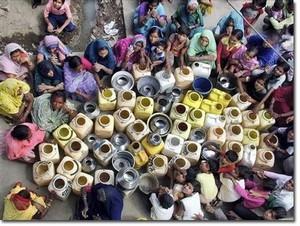WaterA majority on Earth will soon face severe, self-inflicted water shortage: scientists
A conference of 500 leading water scientists from around the world, held last week in Bonn, issued a stark warning that, without major reforms, “in the short span of one or two generations, the majority of the nine billion people on Earth will be living under the handicap of severe pressure on fresh water, an absolutely essential natural resource for which there is no substitute. This handicap will be self-inflicted and is, we believe, entirely avoidable.”

Crowd waiting for water during Indian water shortage // Source: bargad.org
A conference of 500 leading water scientists from around the world last week issued a stark warning that, without major reforms, “in the short span of one or two generations, the majority of the nine billion people on Earth will be living under the handicap of severe pressure on fresh water, an absolutely essential natural resource for which there is no substitute. This handicap will be self-inflicted and is, we believe, entirely avoidable.” The scientists pointed to chronic underlying problems led by mismanagement, and offered a prescription to policy makers in a 1,000-word declaration issued at the end of a 4-day meeting in Bonn, Germany. The conference, Water in the Anthropocene, was organized by the Global Water System Project (GWSP).
The GWSP Bonn Declaration said that in the span of one or two generations, the majority of the nine billion people on Earth will be living under the handicap of severe pressure on fresh water, an essential natural resource for which there is no substitute. The scientists gathered in Bonn said that this handicap will be self-inflicted, and that it is entirely avoidable.
A GWSP release reports that after years of observations and a decade of integrative research convened under the Earth System Science Partnership (ESSP) and other initiatives, water scientists are more than ever convinced that fresh water systems across the planet are in a precarious state.
Mismanagement, overuse, and climate change pose long-term threats to human well-being, and evaluating and responding to these threats are a major challenge to water researchers and managers alike. Countless millions of individual local human actions add up and reverberate into larger regional, continental, and global changes which have significantly changed water flows and storage, impaired water quality, and damaged aquatic ecosystems.
The water scientists say that human activity thus plays a central role in the behavior of the global water system.
Since 2004, the Global Water System Project (GWSP) has launched a broad research agenda and new ways of thinking about water as a complex global system, emphasizing the links that bind its natural and human components. Research carried out by GWSP and its partners has produced several important results which inform a better global understanding of fresh water today.
